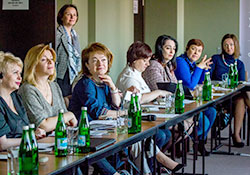Strengthening women’s leadership in public health in Ukraine

WHO/Konstantin Vozniuk
In order to empower and support the development of current and future female leaders who drive public health reform, the Ministry of Health of Ukraine held a seminar entitled “Women’s Leadership in Public Health” in Kyiv on 16–18 May 2017. It organized the seminar with technical support from WHO, contributions from the Association of Schools of Public Health in the European Region (ASPHER) and Maastricht University, the Netherlands, and support from the Swiss Agency for Development and Cooperation.
The seminar was framed within the implementation of the Strategy on women’s health and well-being in the WHO European Region. It was structured around modern leadership theories, which are especially suited to developing female leaders, and reflected real-life experiences of female leaders and role models. Its topics were identified through research and prior analyses of local needs.
Executive coaching was a main feature of the programme. It provided participants with the objective to develop, enhance and build personal leadership attributes for a successful career in the field of public health, and to design personal development plans addressing individual career goals.
Moving towards gender equality in health
While welcoming participants, Deputy Minister of Health Dr Oksana Syvak pointed out the importance of gender balance in the health system. “As a physician, during my study and work years I have observed women’s dominance in the health workforce,” she said. She added: “64.3% of health workers in Ukraine are women, and I was pleasantly surprised to find out that approximately half of the health institutions are managed by women. We have to support this positive trend.”
However, a recent study on female leadership indicated that certain barriers often hinder the full development of women as leaders. These include struggles to find the right balance between professional and personal life, between kindness and toughness, and between emotionality and rationality.
Ukraine’s leaders of today need to be enablers and facilitators who support groups in creating and achieving the shared goal of strengthening the country’s health system. This principle of leadership is reflected in the notion of empowerment. Empowerment is central to health promotion, which enables people to improve their health and address its determinants. Such an approach is the foundation of transformational leadership, in which power for change is based on goals that serve a higher purpose – in this case, the societal goal of better health and well-being for Ukraine.
Dr Katarzyna Czabanowska, Associate Professor at the Department of International Health of Maastricht University and a facilitator for the seminar, reflected: “I expect that the training will be a meaningful learning experience for all of us. I hope it will help us realize how women add value to leading complex public health system transformation with courage and passion, balancing their needs and priorities.”
National policies and regional context
The European Action Plan for Strengthening Public Health Capacities and Services (EAP-PHS) sets out 10 essential public health operations that should be in place in order to achieve a comprehensive public health system. One of these operations is a competent public health workforce.
In September 2016, Ukraine, together with the other Member States of the WHO European Region, adopted the Strategy on women’s health and well-being. Aligned with the EAP-PHS, it contains recommendations for moving the women’s health agenda forward within the health sector and beyond.
The workshop in Kyiv aimed to develop the public health workforce by recognizing gender equality as an essential element: it empowers women to lead public health reforms to further ensure gender equality in the health system, and at the same time invests in the health and well-being of these female leaders.



